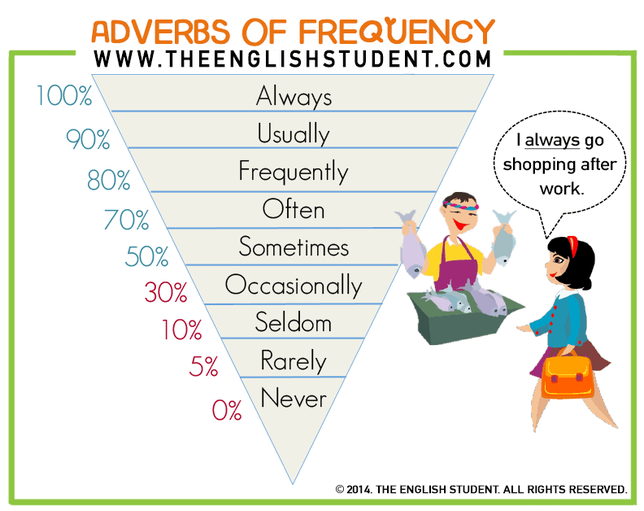Adverbs of Frequency (Review)
Adverbs of Frequency
1. Look for the Adverbs of Frequency in the following text. Pay attention to the position of them.
Reporter: So, Lily, you're majoring in journalism, right?
Student: Yes, that's correct. I'm graduating next June, and I'm looking for jobs now.
Reporter: Well, it is never too early to do that!
Student: I know! So I'd like to ask you a few questions about what's like to work for a newspaper.
Reporter: Sure, go ahead.
Student: Well, my first question is a basic one. Do you pretty much do the same thing every day?
Reporter: No, not really. I rarely do the same thing from one day to the next.
Student: Could you explain that a little bit more?
Reporter: Well, I mean that I always have a story that I'm working on, but the stories are always different, so I never see the same people. I visit different people, go to different places, and so many different things. My job has a lot of variety.
Student: How often are you in your office?
Reporter: Well... some of the time... I mean, my computer is there, and that's where I write my stories, but sometimes I go interview people in their homes or offices. Actually, I spend a lot of time in my car going to and from interviews.
Student: How do you stay in touch with the newspaper then?
Reporter: Oh, I always take my cell phone with me.
Student: Do you usually have a laptop with you too?
Reporter: No. I don't like to use a laptop when I'm interviewing. I sometimes take notes on paper, but I usually use a little voice recorder. Then I type my stories as soons as I get back to the office.
Student: So you don't use email much?
Reporter: Oh, yes, I do. I always check my email before I leave home in the morning, again when I get to the office, before and after lunch, and again before I go home in the evening.
Student: Wow, that's a lot! Do you check your email on weekends, too?
Reporter: Yes, I usually check my email on weekends. I will answer personal emails, but I have a rule that I never answer business emails on the weekend or a holiday.
2. Read each situation, and then answer the question
- Jorge usually does his homework. Raul always does his homework. Diego never does his homework. Who is the best student?
- The weather is Florida is rarely cold. It is sometimes cold in Mississippi. It is usually cold in Alaska. If you don't like cold weather, which state might be a good place for you to live?
- Nedra seldom walks to work. Carol often walks to work. Betty walks to work sometimes- Who might drive to work more than walk there?
- My grandmother sometimes takes a walk after dinner. My brother always runs five miles every morning. I hardly ever exercise. Who gets the most exercise?
- Ramon rarely watches American television. Ivan usually listens to public radio in English. Nadia seldom see English movies. Nadine prefers to talk to her friend in her native language. Who probably hears the most English in a day?
- Maddie often spends three hours per day reading e-books on her e-reader. Her dad is a professor, and he usually reads a chapter in his textbook two nights per week. Her grandfather used to read the newspaper, but now he seldom does. Who probably reads the most?
3. Let's Speak!
Read the following ten statements. Choose a partenr and guess how often your partener does these things. Use Adverbs of Frequency. When you finish, it's time to interview your parter and know how many you have guess good.
If you don't have a partner, you can answer them alone or do it with your teacher.
- How often do you check your email on Saturday?
- How often are you late for work?
- Do you ever use social media sites?
- How often do you call your parents?
- Do you ever listen to news on the radio in the morning?
- How often do you exercise?
- How often do you see your best friend?
- Do you ever skip breakfast?
- How often do you drink coffee?
- How often do you stay up late?

Comments
Post a Comment